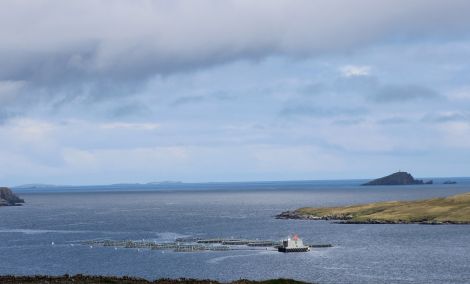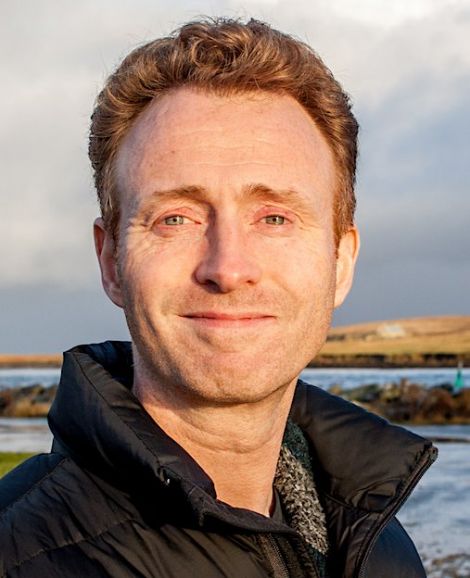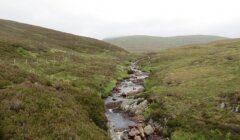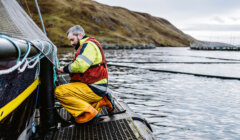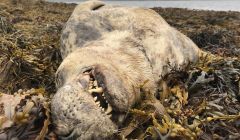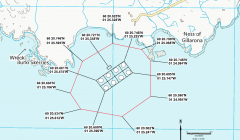Environment / Decrease in number of salmon farms deemed poor in complying with environmental regulations
Two Grieg Seafood salmon farms rated as ‘very poor’ – but local boss says ratings are ‘not always a reflection of unsatisfactory environmental impact’
A TOTAL of ten fish farms in Shetland have been rated ‘poor’ or ‘very poor’ in complying with environmental regulations in 2018 – a decrease on the previous year.
Two Grieg Seafood salmon farms located off the coast of Shetland between Mossbank and Vidlin were deemed very poor by SEPA.
They both had unsatisfactory seabed surveys, while monitoring had been undertaken “significantly outwith the sampling window”.
Grieg Seafood Shetland managing director Grant Cumming said the scheme “measures compliance and is not always a reflection of unsatisfactory environmental impact”, adding that “we are confident that we are farming in a sustainable way”.
A further eight farms were rated as poor when it came to compliance, including sites in and around Unst, Yell and Burwick.
Three aquaculture sites were deemed to be ‘at risk’- as was the Lerwick sewerage network due to the Gulberwick pumping station being unable to convey sewage to the network.
The rest of the sites in Shetland, which included other salmon farms and the likes of Sullom Voe Terminal and Shetland Gas Plant, were categorised as either good or excellent.
The salmon farm figures in Shetland are a decrease on the numbers for 2017, when 16 of the isles’ 56 fish farming sites rated poor or very poor.
Cumming said that there were a couple of reasons for his company’s two ‘very poor’ ratings in Yell Sound.
“Firstly, it is acknowledged that salmon farms will have a limited environmental impact on a small area of seabed around the pens and we use a SEPA approved model to ensure that any impact is sustainable and reversible,” he said.
“Whilst this model works well for most sites, on very tidal sites like those at Yell Sound, it can’t accurately predict where the zone of impact will be. We have agreed a programme of extensive sampling in Yell Sound which will allow us to determine the footprint of impact more accurately.
Become a member of Shetland News
“We will use this information to check that environmental impact is sustainable and allow us to improve our future modelling on tidal sites. We are working with SEPA to better understand the actual impact of very tidal sites.”
Cumming added that the rating for the sites is due to the timing of the sampling being carried out, and does not reflect the environmental conditions at the sites.
“Sampling focuses on evaluating residues of certain medicines on the seabed around our farms and, following constructive engagement with SEPA, we have agreed to take samples between 80 and 169 days after every relevant medical intervention. This ensures that any future assessment will be within the required timeframe. We continue to work hard to improve the ratings of our sites.
“We are confident that we are farming in a sustainable way and understand that as an industry leading producer we must be able to demonstrate scientifically that we are acting responsibly.
“We appreciate SEPA engagement in helping us to solve these problems and look forward to continuing to work with them to achieve full compliance in future.”
On a national level, the Scottish Salmon Producers Organisation (SSPO) said 87 per cent of the country’s 296 marine and freshwater sites were considered to be excellent or good in 2018.
The organisation representing Scotland’s salmon farming industry said nationally salmon farming had achieved its best ever environmental performance.
SSPO chief executive Julie Hesketh-Laird said: “These statistics are very good news for Scottish salmon farming. They represent the significant and ongoing effort and investment to improve environmental performance and I’m delighted that this continued focus on environmental stewardship is delivering positive results.”
Become a member of Shetland News
Shetland News is asking its readers to consider paying for membership to get additional perks:
- Removal of third-party ads;
- Bookmark posts to read later;
- Exclusive curated weekly newsletter;
- Hide membership messages;
- Comments open for discussion.
If you appreciate what we do and feel strongly about impartial local journalism, then please become a member of Shetland News by either making a single payment, or setting up a monthly, quarterly or yearly subscription.






